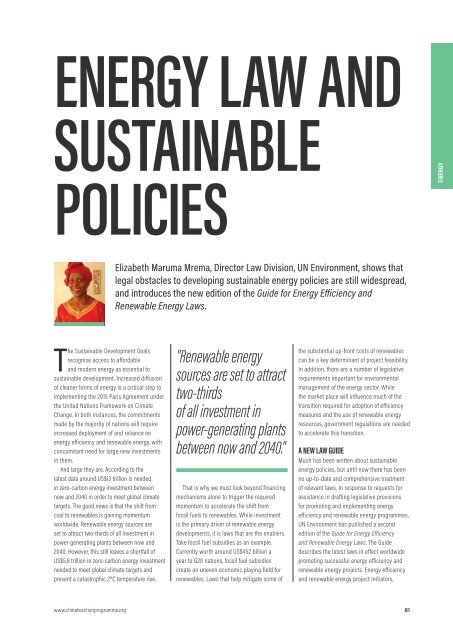Climate Action 2016-2017
Create successful ePaper yourself
Turn your PDF publications into a flip-book with our unique Google optimized e-Paper software.
ENERGY LAW AND<br />
SUSTAINABLE<br />
POLICIES<br />
ENERGY<br />
Elizabeth Maruma Mrema, Director Law Division, UN Environment, shows that<br />
legal obstacles to developing sustainable energy policies are still widespread,<br />
and introduces the new edition of the Guide for Energy Efficiency and<br />
Renewable Energy Laws.<br />
The Sustainable Development Goals<br />
recognise access to affordable<br />
and modern energy as essential to<br />
sustainable development. Increased diffusion<br />
of cleaner forms of energy is a critical step to<br />
implementing the 2015 Paris Agreement under<br />
the United Nations Framework on <strong>Climate</strong><br />
Change. In both instances, the commitments<br />
made by the majority of nations will require<br />
increased deployment of and reliance on<br />
energy efficiency and renewable energy, with<br />
concomitant need for large new investments<br />
in them.<br />
And large they are. According to the<br />
latest data around US$13 trillion is needed<br />
in zero-carbon energy investment between<br />
now and 2040 in order to meet global climate<br />
targets. The good news is that the shift from<br />
coal to renewables is gaining momentum<br />
worldwide. Renewable energy sources are<br />
set to attract two-thirds of all investment in<br />
power-generating plants between now and<br />
2040. However, this still leaves a shortfall of<br />
US$5.8 trillion in zero-carbon energy investment<br />
needed to meet global climate targets and<br />
prevent a catastrophic 2°C temperature rise.<br />
"Renewable energy<br />
sources are set to attract<br />
two-thirds<br />
of all investment in<br />
power-generating plants<br />
between now and 2040."<br />
That is why we must look beyond financing<br />
mechanisms alone to trigger the required<br />
momentum to accelerate the shift from<br />
fossil fuels to renewables. While investment<br />
is the primary driver of renewable energy<br />
developments, it is laws that are the enablers.<br />
Take fossil fuel subsidies as an example.<br />
Currently worth around US$452 billion a<br />
year to G20 nations, fossil fuel subsidies<br />
create an uneven economic playing field for<br />
renewables. Laws that help mitigate some of<br />
the substantial up-front costs of renewables<br />
can be a key determinant of project feasibility.<br />
In addition, there are a number of legislative<br />
requirements important for environmental<br />
management of the energy sector. While<br />
the market place will influence much of the<br />
transition required for adoption of efficiency<br />
measures and the use of renewable energy<br />
resources, government regulations are needed<br />
to accelerate this transition.<br />
A NEW LAW GUIDE<br />
Much has been written about sustainable<br />
energy policies, but until now there has been<br />
no up-to-date and comprehensive treatment<br />
of relevant laws. In response to requests for<br />
assistance in drafting legislative provisions<br />
for promoting and implementing energy<br />
efficiency and renewable energy programmes,<br />
UN Environment has published a second<br />
edition of the Guide for Energy Efficiency<br />
and Renewable Energy Laws. The Guide<br />
describes the latest laws in effect worldwide<br />
promoting successful energy efficiency and<br />
renewable energy projects. Energy efficiency<br />
and renewable energy project initiators,<br />
www.climateactionprogramme.org 81












